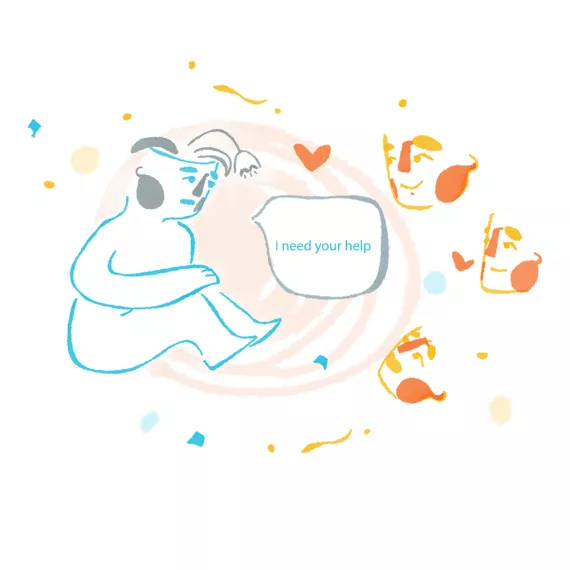Challenges and solving problems
Five tips for overcoming challenging times

- Available in:
- 中文
- English
Life can be full of ups and downs. We all face challenges, some big and some small. So we need to become problem solvers.
1. Calm your mind
You may be feeling helpless, angry, worried, or sad, which is completely normal. Actively calming your mind when experiencing these emotions can help. You can place one hand on your chest and the other on your forehead. Take a few deep and slow breaths in and out. Focus on the breath.
If all these emotions and feelings still come to your mind, picture them like a cloud passing in front of you, eventually floating beyond the horizon, out of view. Feeling more calm can help you tackle your problems more effectively.
2. Avoid blaming people (including yourself)
When something bad happens, our first thought might be to focus on blame: I ruined everything. She made me do it. He started it. I can’t help it. You never listen to me. They don’t understand me. But focusing on whose fault it is will not help you overcome the problem, and it can often feel worse. Instead, try to focus on what you can control and act on to make it better. Think about what needs to change, what you can do, or what support you need.
3. Think the problem through
Asking questions can help you understand the problem better. Why is this a problem? Why did this happen? Why is this so important to you? Who does this affect? What do you think might happen? What is making you feel upset?

4. Make a list of solutions and give them a try
Think about the problem you are facing. Next, try to write down as many ways of overcoming the problem as you can, using a pen and paper if that helps you. They can be any range of ideas, from far-fetched to practical. Then think about the positive and negative consequences for each solution and which ones would be easier to try. Try the best solution. Think about what went well and what did not go well. Sometimes you will need to try more than one solution. Part of problem solving is learning how to adapt your solution and try again.
5. Know when to get help
If you feel stuck or overwhelmed, know that it is a sign of strength to ask for help from someone you trust or a professional helper. Some warning signs that show you may need to get help include:
- You can’t sleep at night or you fall asleep but have a hard time staying asleep.
- You are feeling a decrease in your level of energy or motivation.
- Your eating patterns have changed: either you have lost your appetite, or you can’t stop yourself from eating too much.
- You feel nervous, stressed, irritated, or worried all the time.
- You often suddenly feel panicked. It may feel like you can't breathe, or that your heart is pounding. No matter how much you try to calm down you are not able to relax.
- You feel that you don’t deserve love, respect, or anything good.
- You feel that life is no longer worth living and you have thoughts about hurting yourself or ending your life, or you feel like you would like to just go to sleep and not wake up.
- You are experiencing violence or abuse.
If you start to feel this way it is important to get extra support from people working in local health, social or community services, even if it is difficult to talk about or share.
If you do not want to share everything about how you are feeling or what you are experiencing that is okay - as long as this person knows that you are trying to access support for your well-being, and can help you to access this support. This might mean that you start with sharing a little bit of information, enough for that person to understand what your needs are.
It is especially important if you are thinking that life is not worth living or if you have experienced physical harm to get support as soon as possible to keep yourself safe.

The article was adapted from a post on Voice of Youth, UNICEF's digital community FOR YOUTH, BY YOUTH.
Sometimes we all need some extra support
It’s OK to ask for help. To find additional support, call:
- 12355: A toll-free hotline that provides professional mental health and legal support to adolescents.
- 12320: A toll-free hotline that provides public health counselling, including mental health support.




